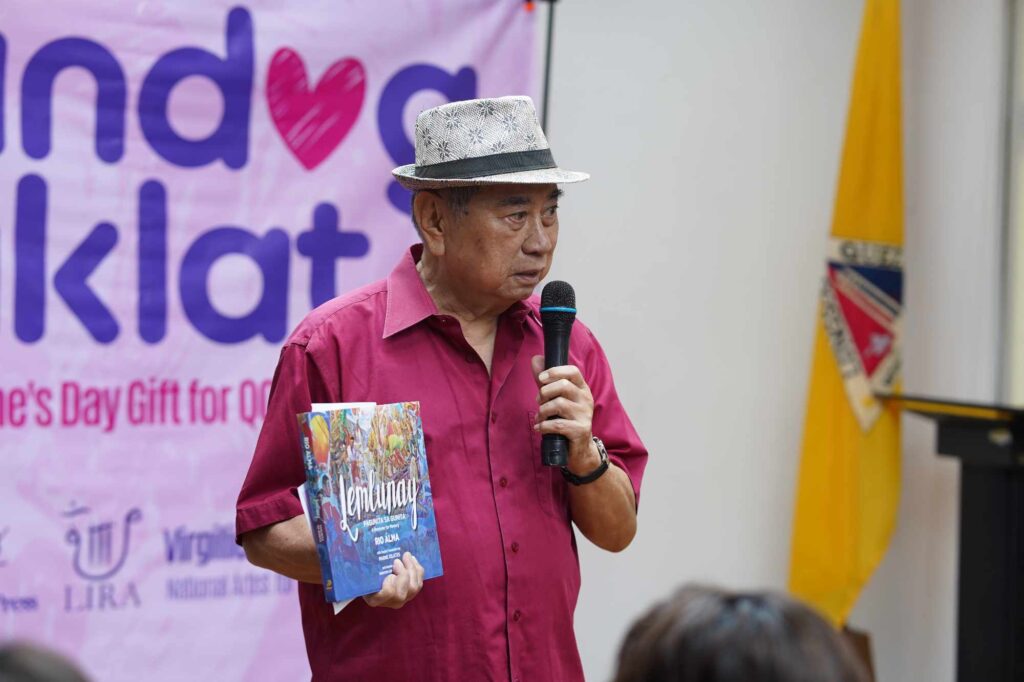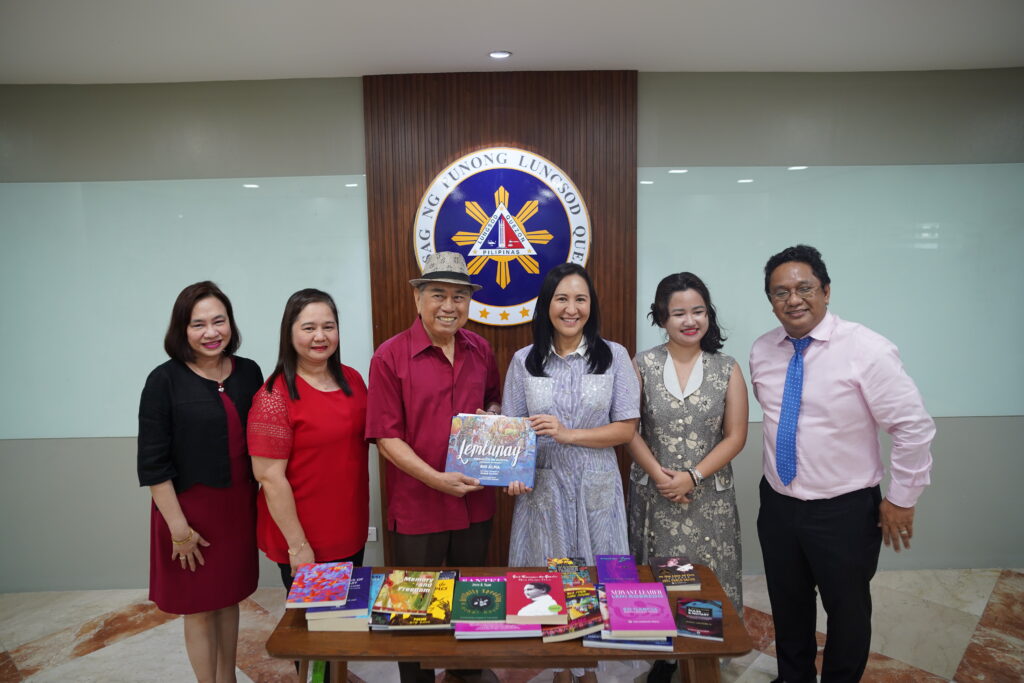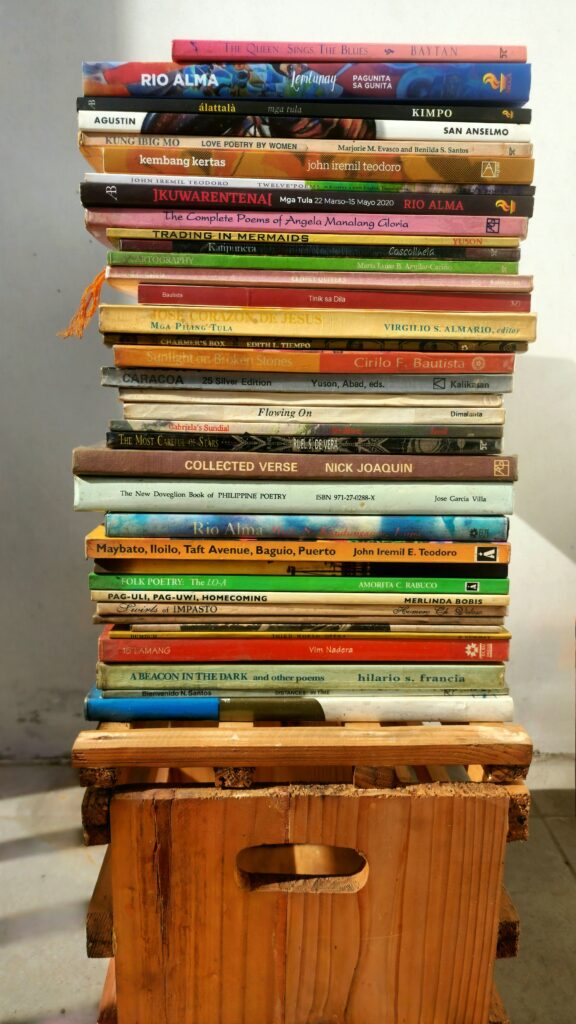Quezon City is often seen as the second capital of the Philippines, and it was actually once proclaimed as the national capital. The fast-growing commercial area has also been known as a center of media and education, being home to leading broadcast networks and universities.

In recent years, Quezon City has emerged as one of the most progressive cities in the country. It is also becoming a cultural hub, strengthened by the intention of making it the Poetry Capital of the Philippines, led by no less than National Artist for Literature Virgilio Almario.
A movement of making Quezon City a literary center was formally launched on Valentine’s Day, 14 February, as the poet, scholar and cultural administrator led a book donation drive for the Quezon City Public Library and its 28 branches.

He planned to hold Libro Para sa Aklatan ng Bayan or LAB yearly, commenting, “Sa halip na magbigayan ng rosas lang o magpalitan ng mga cards na may puso, magbigayan tayo ng libro tuwing Valentine’s Day. Quezon City ang mauuna rito (Instead of just giving roses or exchanging cards with hearts, let us gift each other with books. Quezon City will pave the way).”
He revealed that the inspiration for this was a traditional practice in Europe: “Minsan nasa Europa ako, March, World Poetry Day, birthday ni Shakespeare at death day ni Cervantes. Pagbukas ko ng pintuan, ‘yung mag-aayos ng kuwarto sa hotel, binigyan ako ng rose. Paglabas ko at kakain ako ng agahan, may nag-abot sa akin ng libro. Hindi ko alam pala World Poetry Day. Sabi sa akin ng taga-Barcelona noong dumating ako sa seminar, ‘World Poetry Day ngayon. Dito sa amin, nagbibigayan ng roses at libro’ (When I was in Europe, it was March, World Poetry Day, birthday of Shakespeare and death day of Cervantes. When I opened the door, I was given a rose by the cleaner of the hotel room. When I went out to have breakfast, someone handed me a book. I did not know it was World Poetry Day. The Barcelonan said when I arrived at the seminar, ‘It’s World Poetry Day today. Here, we give roses and books’).”

Almario tried to replicate the practice in the Philippines, giving out the Philippine national flower, the sampaguita or Indian jasmine, at the University of the Philippines, where he taught for a long time. Now, he wants to continue the practice in another way. He himself donated copies of Lemlunay: Pagunita sa Gunita, his latest collection of poems inspired by iconic cultural objects, artifacts and artworks.
Linangan sa Imahen, Retorika at Anyo (LIRA), an organization of poets; and book publisher San Anselmo Publications Inc. led by its executive publisher Marvin Aceron, also distributed their books to the library, which were accepted by Quezon City Mayor Joy Belmonte, Quezon City Public Library officer-in-charge Mariza Chico and assistant officer-In-charge Mary Ann Bernal.
“Suportado ng pamahalaang lungsod na mapalawig ang mga libro sa mga silid-aklatan. Makatutulong din ang mga ito sa pagpapanumbalik ng sining sa pagtula lalo na sa mga kabataan (The city government supports the infusion of new books to the public library. These will certainly revive literature and renew interest in poetry, especially among the youth),” Belmonte said in statement posted on the Quezon City Government Facebook page.
On the other hand, a grateful Chico said, “Kaliwa’t kanan man ang mga nailathala na electronic book at milyon na ang impormasyon sa Internet araw-araw, hindi nito matitinag ang kredibilidad na mayroon ang pisikal na librong pinagtutuunan ng talino at panahon (Amid the proliferation of electronic books and millions of information daily over the Internet, these cannot rival the credibility of physical books that are written with care and attention).”
LIRA vice-president Crystal Tanigue, who is a Quezon City resident herself and personally handed over their books, revealed that she spent many hours at the Quezon City Public Library as a young student.
LAB ushered in the bigger vision of making the sprawling city in the northwestern part of the National Capital Region a poetry capital, which was planned since last year, Almario said.
“Doon sa aming plano, ang pinaka-sentro ng pagdiriwang ng pagtula ay yaong birthday ng kinikilala kong pinakadakilang makata ng Filipinas noong 20th century, si Jose Corazon de Jesus o si Huseng Batute. Marami siyang dakilang tula na nasa textbooks. Ngunit si Jose Corazon de Jesus ang kahuli-hulihang makata sa Filipinas na superstar (In our plans, the celebration is centered on the birthday of who I consider as the greatest poet of the Philippines in the 20th century, Jose Corazon de Jesus or Huseng Batute. Many of his great poems are in textbooks. Jose Corazon de Jesus is the last poet of the Philippines who was a superstar),” he shared.
Almario related how popular De Jesus, who was hailed as Hari ng Balagtasan, was, relating, “Noong American period, kapag tutula si Jose Corazon de Jesus, pinupuntahan ‘yan ng daang-daang tao. Siya ang Hari ng Balagtasan. Kaya sumikat ang balagtasan, ang kanyang pagiging hari… lalong umakit sa mga tao para makinig sa kanya. Kanyang mga tula, nakaplaka, pinakikinggan ng mga tao. Kapag siya ay tumula sa plaza, ‘pag pista at sinabing darating si Jose Corazon de Jesus, dudumugin ng mga tao ‘yun (During the American period, hundreds of people went to see Jose Corazon de Jesus read his poems. He was the King of Balagtasan. Balagtasan became popular because he was the king… and more people were enticed to hear him. His poems were polished, being heard by people. When he read his poems in the plaza, during fiestas or when someone announced that Jose Corazon de Jesus is coming, people would throng).”
He also revealed that large crowds gathered at his funeral when De Jesus died. “Mapaparisan lang ng libing nina Magsaysay, Cory at Ninoy (It was comparable to the funerals of Magsaysay, Cory and Ninoy),” he said.
Almario lamented the decline in popularity of poetry as well as reading.
“Ang isa kasing problema natin sa ating bayan, dinadakila natin ang mga makata pero hindi natin binabasa. ‘Di ba? Dinadakila natin ang panitikan pero hindi natin binabasa. Kung hindi pa i-assign ng teacher sa klase, hindi n’yo basahin. Dapat i-develop natin ay iyong hilig magbasa ng ating mga kabataan. Malaki ang tulong dito ng libraries. Nasa inyo ang mga babasahin. Nasa inyo ang pagkakataon para akitin ang mga tao… ‘Pag naglilibang ay dapat nagbabasa (One problem of our nation is that we honor poets but we don’t read them. Yes? We respect literature but we don’t read. If it was assigned by the teacher, you will not read. We should develop the love of reading among the youth. Libraries will be of big help. They have the reading materials. There are opportunities to entice people… Leisure time should be reading time),” he said.
Thus, the Quezon City Public Library, San Anselmo Publications Inc. and LIRA are collaborating with other divisions within the Quezon City Government for the development and implementation of literary and poetry-related programs and projects in attempts to bring poetry back to people’s rightful regard. At the heart of these is the celebration of National Poetry Day on 22 November, which is also the birthday of De Jesus. Part of the initiatives include the renaming of the Quezon City Public Library Conference Room into the Bulwagang Jose Corazon de Jesus, workshops for teachers, poetry readings, poetry competitions, book publications and many more.
Many writers welcomed this effort including lawyer, playwright and poet Nicolas Pichay who said, “Sang-ayon ako na magkaroon ng sentro ng pagtula sa ano mang lungsod na gustong tumangkilik sa ganitong adhikain. Makabubuti ang kaalaman at pagpapalawig ng tula at pagtula para sa mamamayan ng anumang lungsod, kabilang na ang Lungsod ng Quezon (I agree with having a poetry capital in any city that wants to support this endeavor. Knowledge and promotion of poetry will benefit the residents of any city including Quezon City).”
“Quezon City is poised to become the poetry capital because it’s a city driven by the passionate efforts of its poets, led by luminaries like Rio Alma, who advocated for this vision. Mayor Joy, embracing this initiative, has committed city resources to fund poetry programs and activities. It’s a testament to the city’s dedication and the sustained efforts of its residents. I believe Quezon City’s commitment to nurturing poetry makes it the rightful poetry capital,” Aceron commented.
On the other hand, teacher and port Joel Toledo said, “I’m not sure if I can really say that Quezon City is a poetry capital of sorts, since I’ve not been literally and figuratively going out anymore to scan the landscape, so to speak (aspect of age, I guess). But what LIRA and sir Rio Alma have established in the city indeed helps in a favorable argument for such a claim. Many would-be poets flock to the LIRA workshops held in Quezon City annually. This, along with the universities in Diliman that have creative writing programs. In any case, I think poetry resides less in actual places and more in possible ones.”
Aside from Quezon City, Dumaguete City in Negros Oriental is being eyed as a literary capital, being the home of the legendary Silliman National Writers’ Workshop and many famous writers. Particularly, writer Ian Rosales Casocot dreams of Dumaguete being declared City of Literature in the UNESCO Creative Cities Network.
